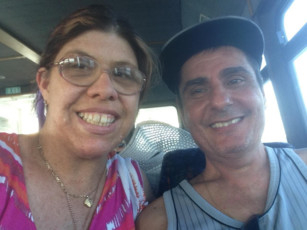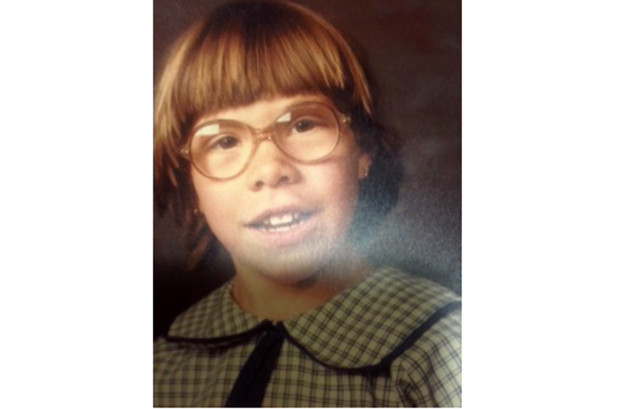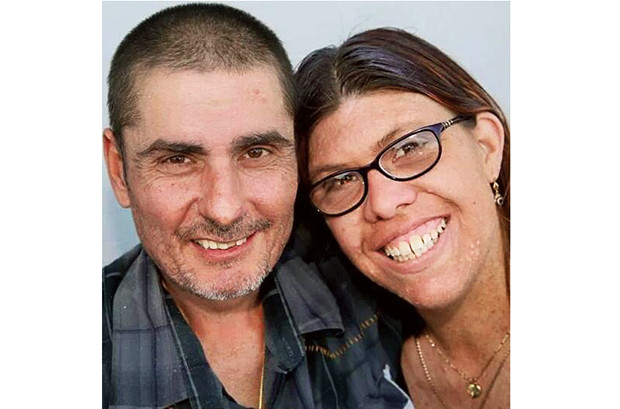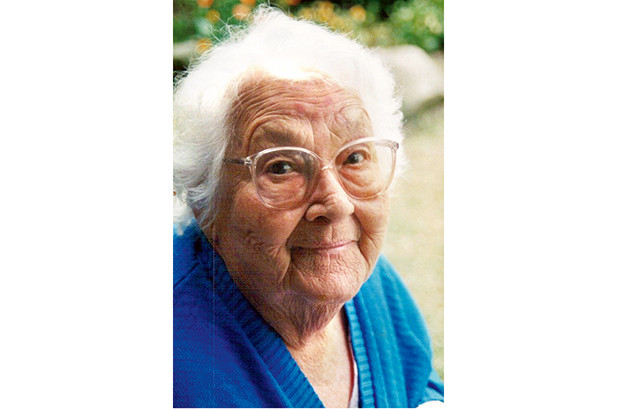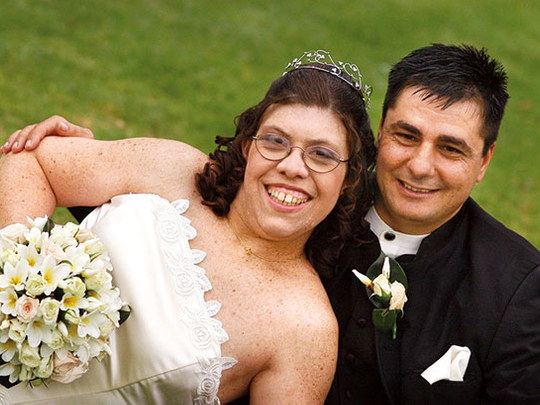
It started as soon as I got on the high school bus. “You’re so ugly you disgust me!” a girl screeched. “Fish face!” her friend mocked. “You’ll never get a boyfriend.” Day after day, it was the same taunts. Did they think I needed to be told what I looked like? It just took a glance in the mirror and I knew I’d never go on a date; never find someone to love me.
I had growths and coffee-coloured marks all over my face and body. It was a genetic condition called neurofibromatosis type 1. No one else in my family had it – just me.
It was at primary school, years earlier, that I’d first realised I was different. “She’s ugly, she can’t play,” a little girl said, turning her back on me in the playground. I didn’t understand; I was nice to other kids, happy and bubbly. Why did my looks matter?
“Ignore them,” my mum, Christine, and dad, Gil, said. I tried to, but it continued throughout my school life.
The high school I attended in Sydney, New South Wales, was hell. With big buck teeth, glasses and my growths, I wasn’t attractive like my classmates, or my older sisters, Eliescha and Belinda. Being told every day I was so ugly that I disgusted people made me feel worthless.
My parents complained to the school and my sisters stood up for me, but the bullying continued. I had just one friend. Most girls wouldn’t be seen with me.
I felt even more isolated when everyone began dating. I saw girls laughing and flirting with boys, holding hands, sneaking a kiss and knew I’d never have that. “Nobody will ever want to marry me,” I sighed to my grandmother. She hugged me and said, “There’ll be someone for you love. Just you watch.”
Her reassurances didn’t work though. “She has to say that, I’m her flesh and blood,” I thought.
No boys asked me to the prom, but I went anyway. The whole night I stood there dying inside as every girl in the room was asked to dance except me.
After I left school I tried to get an administration job, but despite scores of interviews I couldn’t. I knew it was about the way I looked.
Eventually, at 22, I got voluntary work through a disability agency at a community charity shop called The Wash House.
One day I was serving when a good-looking man with dark hair and a cheeky smile walked in. “Hello, how’s it going?” he asked.
He didn’t stare, didn’t do a double take like most people. He just looked at me and smiled. “I’m good,” I said, blushing, thinking how attractive he was. His name was Paul Marinello. He had a bus licence and he’d volunteered to pick up donations for us.
“I’ve got thyroid cancer, so I can’t work, but I wanted to help out,” Paul, 32, told me as we chatted.
I was shocked he was ill, but he was chatty and seemed full of fun. Over the next few weeks I organised lots of pick-ups, just to make sure Paul was around. We became friends.
“I’ve got spots of cancer throughout my body so the prognosis isn’t good,” he confided as we grew closer. “But I’m determined to beat it. Got to stay positive,” he added with a grin. I explained my condition to him too.
I knew I was falling in love with Paul. But with my condition I knew he wouldn’t be interested in me. Nobody ever had been. We were friends and I had to be content with that.
Then my 23rd birthday came round. My parents threw me a surprise barbecue, inviting family and friends. Dressed in tatty old tracksuit bottoms I was stuffing my face when Paul turned up.
“Why didn’t anyone tell me he was coming?” I hissed to my sisters. I bolted inside, did my hair, put on some decent clothes and make-up, then strolled outside nonchalantly.
“You look nice,” Paul smiled. We chatted for ages. He was so easy to talk to, not like other men who I’d always felt just stared at my face. It was as if he saw me as a person, not a condition. With him I could just be myself and relax.
Six months after we met, he asked me out on a date. I was stunned. “Don’t you care about what I look like?” I asked.
Paul looked puzzled. “Bethany, don’t you know? You shine!” he said. “From the moment we met I thought that. When I look at you I just see the beauty inside.” I smiled, touched.
Our first date was at a local aquatic centre. We didn’t stop laughing the whole day. With his prognosis, Paul could have been forgiven for being depressed and miserable. But instead he seemed to seize every day and try and make the most of it. It was a wonderful attitude.
Soon we were spending all our spare time together. But something bothered Paul. “I love you,” he said. “But are you sure you want to be with me? I’ve got cancer. I don’t know what the future holds. It’s not fair on you.”
I shook my head. “Whatever comes up we’ll deal with it together,” I said. “I love you.”
After another six months we decided to move in together.
When I was with Paul, I forgot my condition. It didn’t matter to him so it didn’t matter to me.
He nicknamed me Bubbles because he said I was so happy and bubbly.
One day, I twirled around in a new dress I’d bought, showing it to Paul. “Bethany, you look beautiful,” he sighed. The words took my breath away. I never dreamed I’d hear a man saying them.
Paul was so affectionate, he held my hand everywhere we went. His cancer hadn’t gone into remission but was what doctors called “stable”.
We began discussing marriage. We even looked at rings. “You better make it a romantic proposal,” I said.
I had a feeling he was going to propose one day when we went for a romantic walk along Palm Beach in Sydney as the Australian TV soap Home & Away was being filmed in the background. Sure enough, Paul got down on one knee. “Will you marry me Bubbles?” he asked.
“Yes,” I laughed. “Get that ring on my finger!”
We married at the Holy Family Church in Emerton, Sydney, on October 17, 2004.
Paul was crying as I walked down the aisle. I was wearing a white two-piece wedding dress. “You’re beautiful,” he gasped.
It was the happiest day of my life. My grandmother couldn’t be there because she was suffering from lung cancer. But I saw her afterwards. “You were right,” I smiled. “There was someone for me.” Nan laughed happily. “I told you so!”
Paul and I went to Coff Harbour, a subtropical town halfway between Sydney and Australia’s Gold Coast for our honeymoon.
Not long afterwards Paul developed a small lump on his neck, which kept growing.
Tests showed the cancer was in his lymph nodes and they had to be removed. “Don’t worry. I’m tough. I’ll be fine,” Paul promised. And he was. He bounced back so quickly even the doctors were surprised.
Over the next few years he looked fitter and healthier than most people. He was constantly being monitored and I really believed he’d beat it.
Then, four years after we married, the cancer spread to Paul’s liver. We picked it up because of the regular monitoring and doctors said it was inoperable. “Don’t worry Bubbles,” he shrugged. “I’m a fighter.”
He was put on a trial drug. It helped. The tumour reduced. Again, I began to hope we had a future. “You should do a child-care course,” Paul kept bugging me. “You’re a natural.” I’d always loved kids. They didn’t judge me. All they cared about was whether I was fun or not.
Working with kids was my dream career, but after all the rejections I’d had I’d lost my confidence. Paul’s encouragement gave me a boost.
I went to college, did my Certificate 2 and 3 in child care, which qualified me and got a regular casual position at a nursery in Sydney.
“I could never have done it without you,” I told Paul as we celebrated.
In 2011 one of Paul’s regular scans detected the tumour in his liver was growing again. “How long have I got?” he asked his specialist. I clutched Paul’s hand. “Six months,” he replied. I burst into tears.
“It’s not fair,” I sobbed as Paul hugged me. But he wasn’t ready to give in. “I’m not leaving you Bubbles,” he soothed.
The cancer had spread so quickly and aggressively there was no treatment.
I gave up my job to be with him.
The six months came and went. The tumour was growing, but Paul hung on. “Told you,” he grinned.
But he was slowly getting weaker and losing weight.
In June 2013 his feet suddenly started swelling. Tests showed his heart was failing, he had diabetes, the tumour was still growing and the cancer was in his bones too.
He started a new trial drug. “Hopefully, it will buy me some time,” Paul said. We didn’t know how much, but Paul was very ill.
Slowly, the weight seemed to drop off him. He looked so sick.
By April 2014 he’d lost over 20kg. He’d only been 70kg before at 178cm. He dropped to 50kg. He was so weak he needed help getting around.
Incredibly, he was still positive. “I proved the doctors wrong before,” he grinned. I wanted him to fight, to stay strong, and he did.
Occasionally he’d sigh and say, “I can’t bear the thought of leaving you Bubbles.” I fought back my tears.
“You won’t. You’ll stay around to drive me crazy,” I always joked. Inside though, my heart was breaking.
I loved him so much. He was my world. “There’ll never be anyone else,” I told him one day. I’d been loved so deeply by Paul I knew nothing else could ever compare.
Paul idolised the Sydney Roosters Rugby League team and he spent his days watching their games on TV. He’d got me hooked on rugby too, so I’d sit there and watch games with him and chat about the players.
Friends and family came in to visit. Always smiling, Paul often talked about the future.
On May 5 this year, after I’d been caring for him for a month at home, Paul was so weak he had to be admitted to hospital. “He hasn’t got long now,” a doctor told me.
Propped up in his hospital bed, Paul refused to give up. He kept smiling.
“Love you Bubbles,” he managed to say. And then, finally, after fighting for so long, Paul’s body couldn’t take any more. He slipped away from me peacefully.
He was my soulmate, the love of my life and, like I promised, there’ll never be anyone else.
Some people, like those bullying girls from my school days, would probably say I was too ugly to find love again anyway. But, thanks to Paul, I don’t think of myself as ugly now.
The cancer took him from me, but he’ll always be my one and only; the man who made me feel beautiful.
Bethany Marinello, 35, lives in Blacktown, New South Wales, Australia


